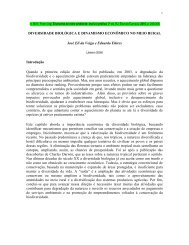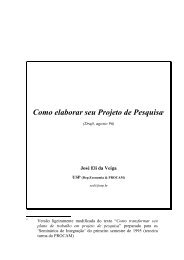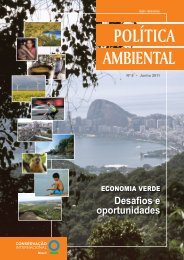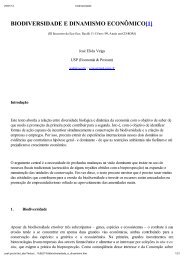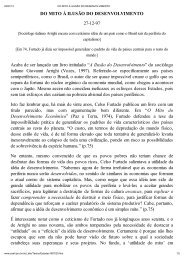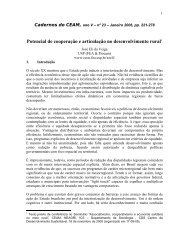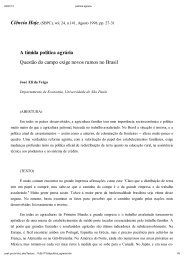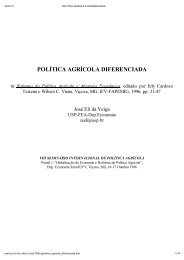sustainable development 20 years on from the ... - José Eli da Veiga
sustainable development 20 years on from the ... - José Eli da Veiga
sustainable development 20 years on from the ... - José Eli da Veiga
You also want an ePaper? Increase the reach of your titles
YUMPU automatically turns print PDFs into web optimized ePapers that Google loves.
13<br />
INTRODUCTION<br />
The United Nati<strong>on</strong>s C<strong>on</strong>ference <strong>on</strong> Envir<strong>on</strong>ment and Development of 1992, also referred to as <strong>the</strong> Earth<br />
Summit or <strong>the</strong> Rio Summit, marked a turning point in awareness of envir<strong>on</strong>mental issues and laid <strong>the</strong><br />
foun<strong>da</strong>ti<strong>on</strong>s for <strong>the</strong> global advance towards <str<strong>on</strong>g>sustainable</str<strong>on</strong>g> <str<strong>on</strong>g>development</str<strong>on</strong>g>. The countries of Latin America and<br />
<strong>the</strong> Caribbean —represented by <strong>the</strong>ir Governments, civil society and <strong>the</strong> private sector— eagerly adopted<br />
<strong>the</strong> agreements reached at <strong>the</strong> C<strong>on</strong>ference and implemented various measures in pursuit of <strong>the</strong> various<br />
goals. The United Nati<strong>on</strong>s C<strong>on</strong>ference <strong>on</strong> Sustainable Development, to be held in <str<strong>on</strong>g>20</str<strong>on</strong>g>12 (labelled Rio+<str<strong>on</strong>g>20</str<strong>on</strong>g><br />
in reference to <strong>the</strong> time elapsed since <strong>the</strong> Earth Summit) will seek to secure a reaffirmati<strong>on</strong> by countries<br />
of <strong>the</strong>ir political commitment to <str<strong>on</strong>g>sustainable</str<strong>on</strong>g> <str<strong>on</strong>g>development</str<strong>on</strong>g>, following an assessment of progress to <strong>da</strong>te and<br />
<strong>the</strong> remaining gaps in <strong>the</strong> implementati<strong>on</strong> of <strong>the</strong> outcomes of <strong>the</strong> major summits <strong>on</strong> <str<strong>on</strong>g>sustainable</str<strong>on</strong>g><br />
<str<strong>on</strong>g>development</str<strong>on</strong>g> (see box 1), and c<strong>on</strong>siderati<strong>on</strong> of <strong>the</strong> new and emerging challenges.<br />
As a c<strong>on</strong>tributi<strong>on</strong> to this assessment, this report, written <strong>from</strong> <strong>the</strong> Latin American and Caribbean<br />
perspective, describes <strong>the</strong> progress made and <strong>the</strong> gaps that remain in implementing global commitments<br />
<strong>on</strong> <str<strong>on</strong>g>sustainable</str<strong>on</strong>g> <str<strong>on</strong>g>development</str<strong>on</strong>g> since 1992. Bearing in mind <strong>the</strong>se gaps and <strong>the</strong> challenges that c<strong>on</strong>tinue to<br />
arise, it proposes guidelines for advancing <str<strong>on</strong>g>sustainable</str<strong>on</strong>g> <str<strong>on</strong>g>development</str<strong>on</strong>g>. The preparati<strong>on</strong> of <strong>the</strong> report was a<br />
multidisciplinary effort involving various organizati<strong>on</strong>s of <strong>the</strong> United Nati<strong>on</strong>s system that operate in Latin<br />
America and <strong>the</strong> Caribbean 1 under <strong>the</strong> umbrella of <strong>the</strong> Regi<strong>on</strong>al Coordinati<strong>on</strong> Mechanism. This<br />
Mechanism was established pursuant to Ec<strong>on</strong>omic and Social Council resoluti<strong>on</strong> 1998/46, “Fur<strong>the</strong>r<br />
measures for <strong>the</strong> restructuring and revitalizati<strong>on</strong> of <strong>the</strong> United Nati<strong>on</strong>s in <strong>the</strong> ec<strong>on</strong>omic, social and related<br />
fields”, with a view to enhancing coherence between <strong>the</strong> programmes, funds and specialized agencies of<br />
<strong>the</strong> United Nati<strong>on</strong>s Secretariat and reports at <strong>the</strong> global level through <strong>the</strong> Ec<strong>on</strong>omic and Social Council.<br />
A. FRAME OF REFERENCE<br />
The frame of reference for this assessment is <strong>the</strong> set of principles defined in <strong>the</strong> Rio Declarati<strong>on</strong> <strong>on</strong><br />
Envir<strong>on</strong>ment and Development (1992). O<strong>the</strong>r reference documents, which have guided implementati<strong>on</strong> of<br />
<strong>the</strong> principles of <strong>the</strong> Declarati<strong>on</strong>, include Agen<strong>da</strong> 21 (1992), <strong>the</strong> Johannesburg Plan of Implementati<strong>on</strong><br />
(<str<strong>on</strong>g>20</str<strong>on</strong>g>02), <strong>the</strong> Rio de Janeiro Platform of Acti<strong>on</strong> <strong>on</strong> <strong>the</strong> Road to Johannesburg (<str<strong>on</strong>g>20</str<strong>on</strong>g>01); <strong>the</strong> Barbados<br />
Programme of Acti<strong>on</strong> for <strong>the</strong> Sustainable Development of Small Island Developing States (1994) and <strong>the</strong><br />
Mauritius Strategy for <strong>the</strong> Fur<strong>the</strong>r Implementati<strong>on</strong> of <strong>the</strong> Programme of Acti<strong>on</strong> for <strong>the</strong> Sustainable<br />
Development of Small Island Developing States (<str<strong>on</strong>g>20</str<strong>on</strong>g>05); <strong>the</strong> Climate Change and Biological Diversity<br />
1<br />
Ec<strong>on</strong>omic Commissi<strong>on</strong> for Latin America and <strong>the</strong> Caribbean (ECLAC), Internati<strong>on</strong>al Strategy for Disaster<br />
Reducti<strong>on</strong> (ISDR), United Nati<strong>on</strong>s Envir<strong>on</strong>ment Programme (UNEP), United Nati<strong>on</strong>s Development Programme<br />
(UNDP), United Nati<strong>on</strong>s Populati<strong>on</strong> Fund (UNFPA), Food and Agriculture Organizati<strong>on</strong> of <strong>the</strong> United Nati<strong>on</strong>s<br />
(FAO), United Nati<strong>on</strong>s Human Settlements Programme (UN-Habitat), United Nati<strong>on</strong>s Educati<strong>on</strong>al, Scientific<br />
and Cultural Organizati<strong>on</strong> (UNESCO), United Nati<strong>on</strong>s Entity for Gender Equality and <strong>the</strong> Empowerment of<br />
Women (UN-Women), United Nati<strong>on</strong>s Children's Fund (UNICEF), Office of <strong>the</strong> United Nati<strong>on</strong>s High<br />
Commissi<strong>on</strong>er for Human Rights (OHCHR), Joint United Nati<strong>on</strong>s Programme <strong>on</strong> HIV/AIDS (UNAIDS), United<br />
Nati<strong>on</strong>s Centre for Regi<strong>on</strong>al Development (UNCRD), World Food Programme (WFP), Pan American Health<br />
Organizati<strong>on</strong> (PAHO), United Nati<strong>on</strong>s Office for Project Services (UNOPS), Internati<strong>on</strong>al Labour Organizati<strong>on</strong><br />
(ILO), World Tourism Organizati<strong>on</strong> (UNWTO), United Nati<strong>on</strong>s C<strong>on</strong>ference <strong>on</strong> Trade and Development<br />
(UNCTAD), Global Mechanism of <strong>the</strong> United Nati<strong>on</strong>s C<strong>on</strong>venti<strong>on</strong> to Combat Desertificati<strong>on</strong>, UN-Water Decade<br />
Programme <strong>on</strong> Advocacy and Communicati<strong>on</strong>.



